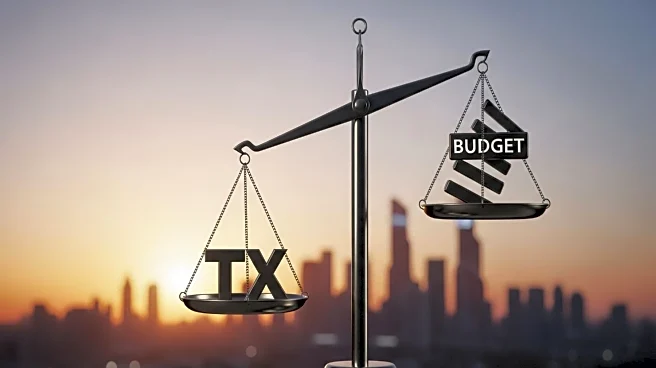What's Happening?
The Russian government, led by President Vladimir Putin, is facing significant economic challenges due to the ongoing war in Ukraine. To address a growing budget deficit, Moscow is planning to implement tax hikes and spending cuts. The draft budget for 2026, expected to be submitted to parliament soon, includes a proposal to raise the value-added tax from 20% to 22%. This move comes despite a previous pledge by Putin not to increase taxes before 2030. The budget deficit has reached approximately 4.2 trillion rubles, with expectations of further increases. The Kremlin is prioritizing military spending, leading to cuts in other areas such as education, healthcare, and social services.
Why It's Important?
The economic measures being taken by Moscow highlight the severe financial strain caused by the war in Ukraine. The focus on maintaining high military spending at the expense of social services could have long-term implications for Russian society. Additionally, the potential for increased sanctions from the U.S. and EU could exacerbate these economic challenges. The situation underscores the interconnectedness of global economies, as changes in Russian fiscal policy could impact international markets and geopolitical dynamics. The U.S. has considered secondary sanctions on countries like India and China, which could further pressure Russia economically.
What's Next?
The draft budget is expected to be finalized soon, with minor changes anticipated. The international community, particularly the U.S. and EU, may respond with additional sanctions, which could further strain Russia's economy. The Kremlin's continued focus on military spending suggests that domestic social services will continue to face cuts. The potential for a peace deal may increase as economic pressures mount, but the outcome remains uncertain.
Beyond the Headlines
The economic strategies employed by Russia could lead to significant societal impacts, particularly in areas like education and healthcare. The prioritization of military spending over social services may lead to increased public dissatisfaction. Additionally, the potential for increased sanctions highlights the geopolitical tensions between Russia and Western nations. The situation also raises questions about the effectiveness of sanctions as a tool for influencing international behavior.








